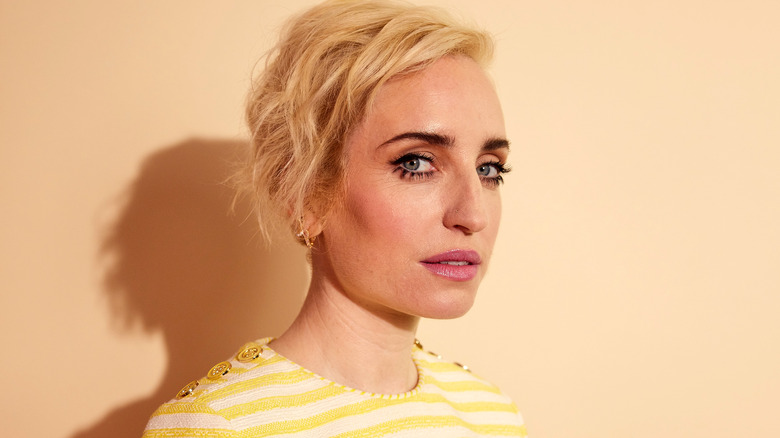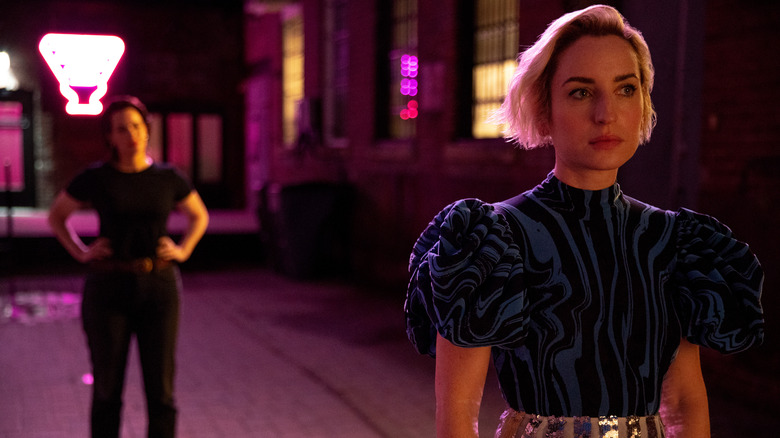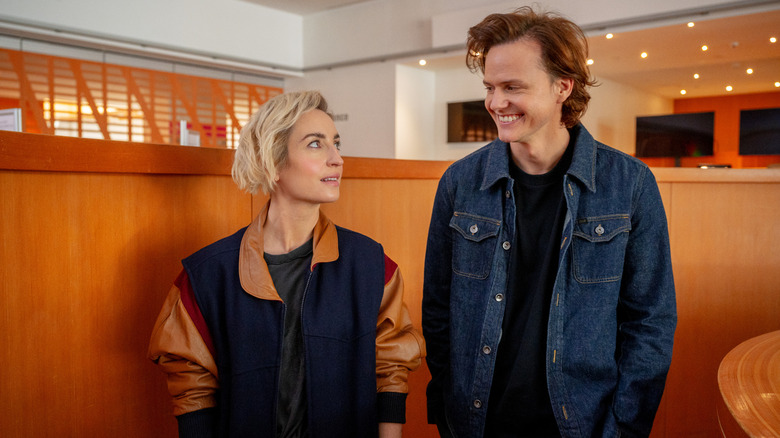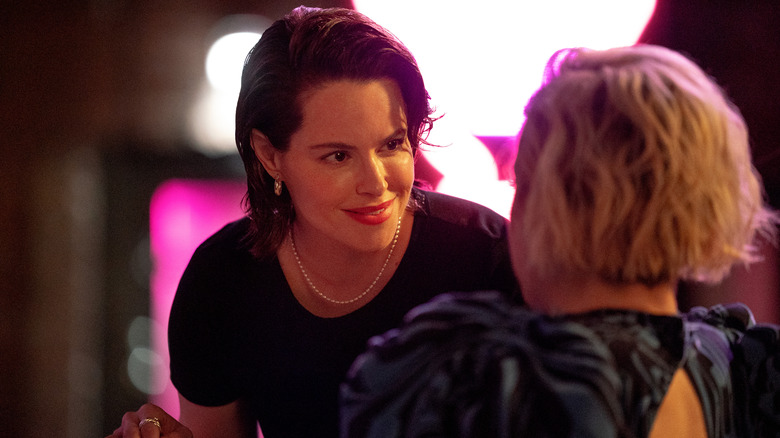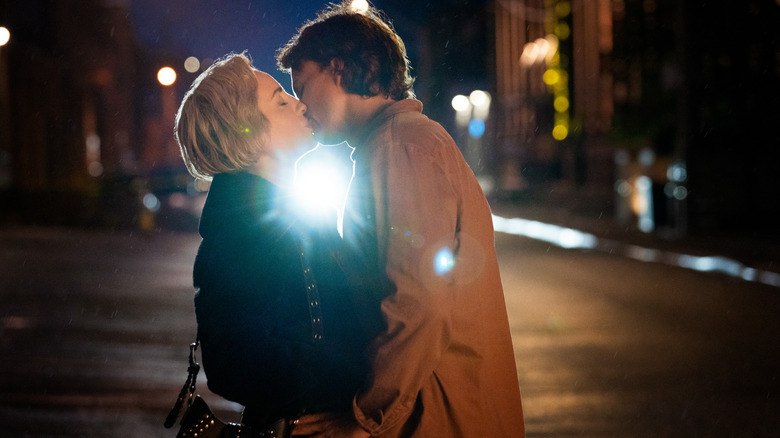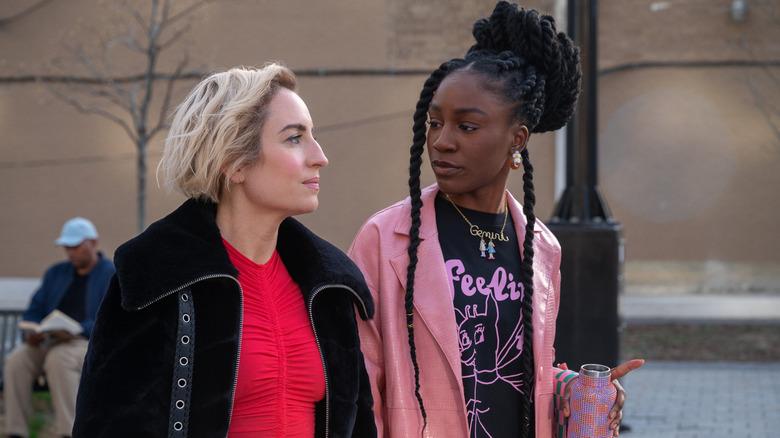Zoe Lister-Jones Discusses Writing, Directing, And Starring In Slip - Exclusive Interview
Questioning the outcome of a major life decision is enough to keep anybody up at night. What would have happened if you had done just one thing differently? What would your life look like today? Would you be a happier person?
In the new series "Slip," these questions are something that a woman named Mae (Zoe Lister-Jones) thinks about every day. Though she's not necessarily unhappy in her marriage to her faithful husband, the spark she once felt for her life seems to be missing — which leads her to "slip" and sleep with a total stranger whom she meets at a bar.
Mae wakes up living a completely different life the next morning. In this life, she's married to the man she met the previous night, and she is now set on getting herself back home. As she searches for her place in the universe, Mae is sent on a crazy adventure across alternate dimensions that all show her exactly what might have been if she never ended up with her husband.
We had the opportunity to sit down with the writer, director, and star of the new series. In an exclusive interview with The List, Zoe Lister-Jones explained the "unconventional manner" in which she wrote the script, opened up about the challenges that come with working on both sides of the camera, and shared how her perspective on what it means to "find home" has changed since creating the series.
The inspiration behind the story Slip
Your character, Mae, explains in the series that the concept of "Slip" is based off of the Buddhist belief of slipping into other parallel universes. What inspired you to write a series about this?
Just so you know, I am no Buddhist scholar, and that's not really a central tenet of Buddhism. But I was excited to explore the multiverse, and there are definitely Buddhist themes throughout.
I was interested, in particular, in this Buddhist archetype of the hungry ghost and this insatiable hunger that we are all always contending with for wanting more, and what would bring us that ultimate sense of satisfaction or groundedness in a life that we can never quite grasp. I wanted to explore that through the lens of modern relationships, particularly sex and sexuality.
"Slip" was born out of all of those ideas co-mingling, and I thought it would be so fun to take viewers on a wild adventure that was escapist but also about the fantasies that we all tend to fall victim to, about, "What would my life have looked like if I had taken a different path at any given juncture?"
Jumping into parallel lives for my character, which she's transported [to] through orgasm [laughs], was an amazing way for me to explore all of those themes, but in a way that felt irreverent and new for me as a filmmaker.
Lister-Jones wrote Slip 'in a pretty unconventional manner'
Were there any alternate storylines or even alternate universes that you thought about initially that didn't end up making it into the final script?
No, I don't think so. I wrote this in a pretty unconventional manner. I wrote all seven episodes in lockdown by myself. Generally, in television, you have a writer's room, and you're outlining, and there are many fingers in the pot, so to speak. This, I didn't outline. I knew the story that I was interested in telling, but I wanted to let my imagination take the reins. It's very much a pure look into my own psyche. [laughs]
There were no things that I didn't include or wanted to include that I couldn't. That's in large part thanks to Roku giving me so much artistic freedom and allowing me to make the show that I dreamed of making.
Are there any scenes that you wrote for yourself that you were most excited to portray on screen?
They were all pretty exciting. That's the beauty of writing for myself as an actor — I get to create all of the scenarios that feel exciting, challenging, and fun for me to play. And I did.
Even though it was such a huge task and I had so many responsibilities, I did set out to try and have fun, and I did have a lot of fun.
The challenges of being on both sides of the camera
You not only wrote and star in "Slip," but you directed the series as well. What challenges come with being on both sides of the camera, seeing as your character, Mae, is in pretty much every scene?
Where to begin with the challenges? [laughs] It requires a huge amount of prep because once on set, I'm straddling so many different responsibilities that communication is so key with department heads because everyone needs to be on the same page. Everyone needs to know the vision inside and out so that when I'm in front of the camera and there's not enough time for me to be running back to monitor to watch playback, we all know exactly what we're setting out to achieve, and we all have plan B's and C's when those things might not go according to plan.
The biggest challenge is one of preparation, and [another part of that] for me [was] shot listing seven episodes ahead of time, because we block shot them all, so we shot it almost like a film. Those things prove the most challenging because they're not just time-consuming but require so much creative energy and attention, and in such a hyper-focused way. But it's all thrilling to do. The thrills outweigh the challenges.
Is the entire series a dream?
Something that I noticed from watching was how often you reference living in a parallel universe while you're asleep and dreaming. Was it your intention that these parallel universes are all just a dream to Mae, or are you leaving that interpretation open to audiences?
I like to leave things open to interpretation.
I didn't see them as a dream to Mae. I liked the idea of us actually going on a multiversal romp. [laughs]
The show opens with a monologue that does address what you're talking about, which is this idea of waking life, of when we're watching ourselves from on high and one step removed from being in our own bodies, which I think is so common, and to try to navigate what's authentic and what's not, what feels like it's taking us on the right road and what's not taking us on the right road, and also to explore fantasy. Dreams are the ultimate way for us to gain access [to] our fantasies and our fears, and this journey is that for Mae, for sure.
How creating Slip changed her outlook on life
Did working on this series change your perspective on life, relationships, or religion in any way?
My interest in Buddhism was a big part of me writing the series, and it did take me on a spiritual journey that totally had an influence.
In terms of relationships, Mae is on this journey to return to her sense of home. No matter where she's being thrust into, universe to universe, she's always trying to get back to the life that she believed to be her own. Ultimately, her journey is to find home in herself, and that was a good lesson for me too, personally.
What kind of concepts and themes would you love to explore and write about in the future?
I'm always fascinated by relationships. They're so complex, and we have not cracked the code. [laughs] I'm sure that I'll continue to explore relationships, but I always try to find a new way in that's exciting for me and that I feel like I haven't seen before.
The 1st season of "Slip" is available to stream starting today, April 21, on The Roku Channel.
This interview has been edited for clarity.
